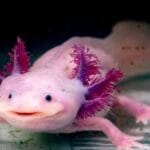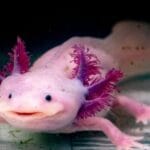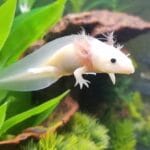Hey there, axolotl enthusiasts! Let’s dive into the amazing world of these cute and long-lived creatures. We’ll uncover the secrets behind their extended lifespans and guide you in providing the best care for your axolotl pals. So, get ready to unravel the mystery of axolotl longevity and prepare to be amazed by their incredible abilities!
Factors Influencing Axolotl Lifespan: Helping your Pet Thrive
Axolotls are those amazing little creatures that can regrow their limbs – how cool is that? But when it comes to how long they live, it’s a bit of a puzzle. Out in the wild, they face all sorts of dangers every day, so their average lifespan is only about 10 to 15 years. But in captivity, with the right care, they can often live well into their late teens or even their early twenties.
If you’re thinking about getting an axolotl or you already have one, here are some things you can do to help them live a long, healthy life:
1. Water Quality: The Cornerstone of Axolotl Health
Just like us, axolotls need clean water to stay healthy. They’re happiest in water that’s the right temperature (around 60-68°F), isn’t too acidic or alkaline (aim for a pH of 7-7.5), and doesn’t have a lot of harmful chemicals like ammonia or nitrites. Think of it like making sure they have a refreshing swimming pool all the time! Clean water helps keep them stress-free, reduces the risk of diseases, and basically helps them thrive.
2. A Balanced Diet: Fueling Axolotl Longevity
Axolotls are carnivores, so they need a diet that’s rich in protein. Think of it like making sure they have a hearty and satisfying meal! High-quality foods like bloodworms, brine shrimp, and special axolotl pellets give them all the nutrients they need to grow and stay healthy.
3. Creating a Peaceful Habitat
Stress can really take a toll on axolotls, just like it can with us. They’re most comfortable when they have plenty of space to swim around (at least a 20-gallon tank for one axolotl), some cozy hiding spots, and aren’t overcrowded with tank mates. It’s kind of like making sure they have their own little sanctuary where they can relax and feel safe.
4. Genetic Factors
Just like every living thing, an axolotl’s lifespan can be influenced by its genes. Some axolotls might be predisposed to living longer because of their genetic background. While there’s no way to change their genes, understanding this can help you tailor their care and potentially help them live longer.
5. Proactive Health Monitoring
Even with the best care, axolotls can sometimes get sick or injured. It’s important to be vigilant and seek veterinary care if you notice anything unusual. Early detection and treatment can make a big difference in their recovery and overall lifespan. It’s a lot like taking your pet to the doctor for regular checkups!
Wild vs. Captivity: Unraveling the Lifespan Discrepancy
You might be wondering why axolotls tend to live longer in captivity than in the wild. Well, it’s all about the challenges they face in their natural environment. In the wild, they have to constantly worry about predators, loss of habitat, and exposure to diseases. But in captivity, they have the luxury of a controlled environment, regular meals, and immediate access to healthcare.
The Immortality Myth: Separating Fact from Fiction
You might have heard rumors about axolotls being immortal. While their ability to regenerate limbs is pretty awesome, it’s important to remember that they’re not immune to aging or diseases. They can’t live forever, but with proper care, you can give them the best possible chance at a long and fulfilling life.
### Axolotls: Windows into Regeneration and Conservation
Studying how axolotls age in both the wild and in captivity is about more than just keeping our pets healthy. It helps us understand more about their biology and what makes them so resilient. This knowledge can even help scientists in their efforts to protect wild axolotls, whose populations are sadly declining. Discover the fascinating world of the enigmatic Asian arowana dragon fish, another fascinating species, or dive into the captivating life story of the axolotl, with its uncanny ability to regenerate lost body parts.
How Long Do Axolotls Live as Pets?
It’s pretty incredible how much longer axolotls can live in our care compared to their lives in the wild.
Think about it: in their natural habitat, axolotls face all sorts of challenges – predators, changes in their environment, and even just the struggle to find food. This means they usually live for about 5 to 10 years.
But here’s the cool part: an axolotl living the good life in a well-maintained tank can easily reach 10 to 15 years old! And, some axolotl owners will tell you stories about their beloved pets living well into their late teens and even their early twenties! It’s amazing what a little TLC can do.
Remember: just like people, axolotls thrive when they’re living their best lives.
- Clean Water is Key: Imagine if you had to live in a swimming pool that was never cleaned – yuck, right? Axolotls feel the same way.
- A Balanced Diet: Nobody wants to eat the same thing every day, right? Axolotls feel the same!
- A Stress-Free Zone: Ever notice how stress can make you feel run down? Axolotls experience stress too.
- Good Genes Matter: Just like some families are prone to certain health conditions, axolotls can inherit predispositions to certain issues that might impact their lifespan.
- Early Care is Crucial: Think of it like giving a child the best possible start in life. Proper care for a young axolotl, from the right food to a stress-free environment, lays the foundation for a long and healthy life.
While there’s no magic formula to guarantee a long life for your axolotl, giving them the best possible care significantly increases their chances of living a long and happy life. And who knows, you might even get to celebrate their 20th birthday with them!
Are Axolotls Hard to Keep Alive?
So, you’re thinking about welcoming an axolotl into your life? That’s awesome! These guys are seriously cool and can be amazing companions. But before you dive in, it’s super important to know that while they might look like low-maintenance pets, taking care of an axolotl is a bit more challenging than caring for a goldfish. Think of it more like having a small, very sensitive underwater friend who relies on you for everything.
One of the biggest things to consider is their lifespan. Axolotls can live for a surprisingly long time – we’re talking 10 to 15 years! That’s a much longer commitment than many people realize. To keep your axolotl happy and healthy for that long, you’ve got to be ready to provide them with the right care.
And speaking of care, the most important thing for these water-dwelling buddies is, you guessed it, water! And not just any water will do. We’re talking pristine, crystal-clear water that’s been carefully filtered and kept at just the right temperature, somewhere between 60 and 68°F. That’s cooler than most people keep their homes. You also need to make sure the water’s pH level is balanced to avoid stressing out your axolotl’s sensitive skin. Think of it like creating a perfect mini-lake just for them.
Then there’s the matter of food. These guys are carnivores, which means they need a diet rich in protein. Forget the fish flakes! Your axolotl will need a steady supply of tasty treats like bloodworms, brine shrimp, or even earthworms.
Speaking of dinosaurs, did you know axolotls can regenerate their limbs? It’s true! But even with their incredible healing abilities, these guys are still sensitive creatures. They need a spacious tank, at least 20 gallons to be exact, with a soft, sandy bottom to mimic their natural habitat. Imagine trying to relax in a cramped, uncomfortable space. Not fun, right? Your axolotl feels the same way!
And don’t forget about stress. Just like us, axolotls can get stressed out by things like loud noises, sudden movements, or even being handled too much. It’s important to create a calm and peaceful environment for them, with plenty of hiding spots and gentle lighting. Think of it like creating a zen garden… but underwater!
Now, we don’t want to scare you off. Axolotls can bring so much joy, but it’s important to be prepared. Owning an axolotl is a rewarding experience, but it’s not for everyone. However, if you’re willing to put in the effort and learn all about their unique needs, you’ll be rewarded with a fascinating, long-lived companion.
Can Axolotls Live for 100 Years?
You might have heard whispers of axolotls living for a century – a captivating idea, right? While these unique creatures are absolutely fascinating, a 100-year lifespan is a bit of a stretch. In reality, they typically grace us with their presence for around 10 to 15 years when cared for in captivity.
Now, why the gap between myth and reality? Let’s break down what shapes an axolotl’s lifespan.
Think of it like this – a bunch of puzzle pieces need to fit just right for an axolotl to thrive. Clean water is super important, like a breath of fresh air for us. Then there’s their diet – they need nutritious foods like bloodworms and brine shrimp, kind of like how we need our fruits and veggies.
Stress plays a big role too. Imagine being constantly surrounded by a crowd or suddenly having your home rearranged – not fun, right? Axolotls feel the same way. Genetics also come into play, much like some families are prone to certain health conditions. And of course, regular checkups with a vet are crucial, just like we visit the doctor when we’re not feeling our best.
Out in the wild, life throws extra curveballs at axolotls. They have to contend with pollution and the constant threat of predators, making survival a tougher game. It’s no surprise that their lifespan in the wild shrinks to about 5-10 years.
Captive axolotls, on the other hand, hit the jackpot with a controlled environment and attentive care. Think of it as having a personal chef, a pristine home, and a dedicated healthcare team – no wonder they live longer and healthier lives!
Here’s the bottom line:
- Axolotls, on average, live for 10-15 years in captivity.
- Water quality, nutrition, stress levels, genetics, and regular health checks are major players in their lifespan.
- Captive axolotls outlive their wild counterparts thanks to a safer and more controlled environment.
While their ability to regenerate limbs is remarkable, it’s important to remember that axolotls aren’t immortal. They have a finite lifespan, just like any other creature.
- Senior at What Age: Benefits & Eligibility Guide - March 29, 2025
- Unlocking Senior Benefits: How Old is a Senior? Your Complete Guide - March 29, 2025
- Master Russian Politeness:A Guide to Saying Please - March 29, 2025
















